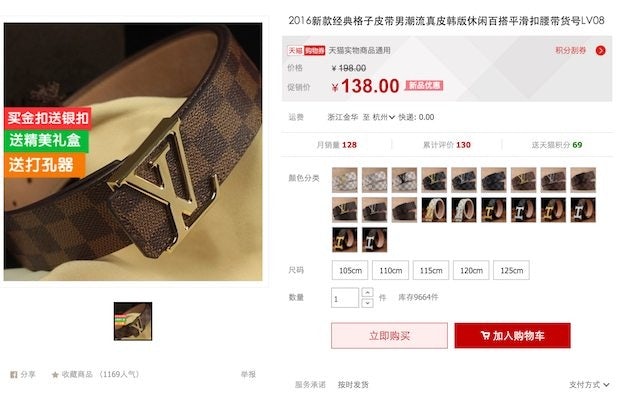
As luxury brands continue to struggle with the flood of fake goods being sold online in China, Louis Vuitton has opted to take legal action with a new lawsuit filed in a Beijing district court.
A statement on the court’s website released on Monday reports that the label is suing three individuals convicted of selling counterfeit goods on Alibaba’s online shopping platform Taobao. It states that the company has listed one person surnamed Liang and two surnamed Han in the suit, demanding damages of 250,000 RMB ($37,900). The defendants received criminal sentences in 2014 for selling counterfeit Louis Vuitton clothing, shoes, and handbags between 2011 and 2014.
The lawsuit by the LVMH-owned company comes nine months after luxury conglomerate Kering pursued legal action regarding fakes on Alibaba’s platforms. Unlike LVMH’s decision to go after individual sellers, Kering sued Alibaba directly, and opted to file the suit in the United States instead of China.
In contrast to Kering’s decision to sue Alibaba, LVMH signed a cooperation agreement with Taobao in 2013 to fight fakes on its platforms. Under the agreement, Taobao agreed to proactively track down and remove listings of counterfeit LVMH items.
As it attempts to attract foreign investors and revive stock prices, Alibaba has been working to defend its reputation when it comes to fakes. In December, it hired a former counterfeit investigator from Apple as its new head of global intellectual property enforcement. This decision came after the American Apparel & Footwear Association called on the United States Trade Representative (USTR) to add Alibaba back onto its “black list” of “notorious markets” for fakes, following its 2012 removal from the list. Alibaba has also taken recent measures such as hiring additional staff to fight fakes and releasing an English-language version of its intellectual property reporting system.
The luxury industry will likely be watching closely to compare outcomes of the lawsuits filed by Kering and Louis Vuitton, and the courts’ decisions could have an impact on the way brands formulate their China anti-counterfeit strategy in the years to come. Kering has faced challenges with its U.S. lawsuit, as Bank of China has refused to comply with a subpoena to disclose information about counterfeiters’ bank accounts to the New York District Court. The bank is also appealing a fine of $50,000 a day imposed by the court, arguing that the order violates Chinese bank secrecy laws.
Meanwhile, Louis Vuitton’s lawsuit seems to have more legal legitimacy in China, but the small sum of money it’s demanding implies that the suit is aimed at deterring sellers rather than seeking any significant damages. If it does win, the question is whether or not the fear of future lawsuits can have a significant impact on the decisions of online sellers hawking fakes across China’s online and social media platforms.